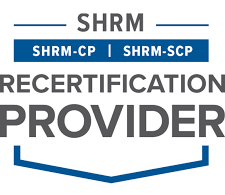ERI Distance Learning Center Online Courses
Free Compensation Courses - credit not available
Total Rewards Foundation
15 Federal Employment Laws That Impact Compensation and Benefits
Employers and human resources professionals need to know how federal laws govern employee compensation and benefits administration. This course will cover the salient laws such as those impacting pay, taxes, equal opportunity, affirmative action, mandated benefits, and other benefits including COBRA, HIPAA, FMLA, ERISA, and the Affordable Care Act. ...More
Credit for CCC: 1
Job Analysis, Descriptions and Evaluation
73 Analyzing Salary Surveys
Quality salary survey data is essential to a competitive compensation plan. There are many options for obtaining salary survey data: government surveys, internet data, published surveys, survey software databases, computer data banks, or even conducting or sponsoring your own survey. This course explores each of these options and explains what you ...More
Credit for CCC: 1
Salary Administration
77 Pay-for-Performance
Pay-for-performance is an effective way to motivate employees to make greater contributions to the organization. To make the performance-reward connection, there has to be a way to compare employee contributions. This course will look at circumstances where a pay-for-performance system is workable, different performance appraisal methods, and how t ...More
Credit for CCC: 1
Variable Pay
75 Creating a Variable Pay Plan
Variable pay plans provide flexible and responsive pay strategies that may be used to lower costs when organizations are experiencing hard times. They may also be used to enhance organization performance and employee loyalty. This course will focus on different kinds of short-term incentive plans, what needs to be taken into consideration to succes ...More
Credit for CCC: 1
72 Nonprofit Variable Pay
Today, variable pay is widely used in nonprofit organizations. In this course you will review the regulations that govern nonprofit pay. You will learn how to use different kinds of variable pay plans to target different outcomes, how to design a plan based on a variety of criteria, and the importance of setting reasonable, relevant performance mea ...More
Credit for CCC: 1
20 The Basics of Equity Compensation
This course presents a basic overview of equity compensation. You will learn about stock options including ISOs and NSOs, restricted stock, restricted stock units, stock appreciation rights, phantom stock, and employee stock purchase plans. Trends in equity compensation will be discussed. Tax implications for employees, including how to get favorab ...More
Credit for CCC: 1
Executive Compensation
42 Accumulated Earnings and Deferred Compensation
Taxes are an important consideration when deciding how to distribute a closely held company’s earnings. This course covers the tax implications of accumulated earnings and how applicable IRS rules seek to encourage dividend distribution over retaining excess earnings in the company. Then it will look at how the IRS identifies personal holding compa ...More
Credit for CCC: 1
22 Black-Scholes Valuations
Stock options are an important and popular component of executive compensation packages. This course teaches you how to place a value on stock options using the Black-Scholes method. We explain each step of the Black-Scholes formula, describing the consequences of its assumptions and the reason why ten different companies might derive ten different ...More
Credit for CCC: 1
26 Compensation Committees: Framework for Executive Compensation Alignment
Compensation committees are responsible for the effective design and evaluation of executive compensation programs. These generally focus on achieving short-term operating plan execution coupled with long-term sustainable business performance alignment. The framework within which these responsibilities are fulfilled entails assessing the current ...More
Credit for CCC: 1
21 Compensation for Business Leaders
Employees in top management positions have compensation packages that are custom tailored to the position. This greater complexity is necessary because top management is responsible for the success of the organization and meeting the expectations of stakeholders. Their compensation packages need to be designed to incentivize and reward results taki ...More
Credit for CCC: 1
18 Intermediate Sanctions
Nonprofit executive compensation is regulated by intermediate sanctions, rules that penalize disqualified persons who receive excess benefit transactions from 501(c)(3) and 501(c)(4) tax exempt organizations. Organization managers involved in such transactions are also subject to penalties. This course will examine how to identify a compensation ex ...More
Credit for CCC: 1
12 IRS Reasonable Executive Compensation
The U.S. Internal Revenue Service (IRS) monitors executive compensation in closely held companies to ensure that any pay that is deducted meets the tests for reasonable compensation. This course looks at IRS compensation challenges that arise when shareholder-employees improperly reduce their taxes through underpayment or overpayment of compensatio ...More
Credit for CCC: 1
Employee Benefits
53 Employee Benefits Strategies
This course provides an overview of strategic employee benefits planning. First, you’ll learn what benefits your organization must offer according to federal requirements. Then you’ll look at the discretionary benefits that are offered by most organizations and what they cost. You will learn how to control employee health care costs. This course co ...More
Credit for CCC: 1
74 Trends in Retirement Plans
Retirement plans are an important component of employee benefits. In this course you will learn about demographic trends that are influencing retirement plans. There will be an examination of Social Security: the kind of benefits it pays, how it is funded, eligibility requirements, and the health of the fund. You’ll look at several different types ...More
Credit for CCC: 1

ERI Economic Research Institute is recognized by SHRM to offer Professional Development Credits (PDCs) for the SHRM-CP® or SHRM-SCP®




